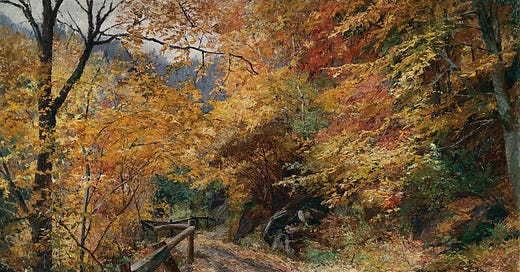'The landscape listens'
'Daylight savings' brings thoughts of winter, so here's Emily Dickinson to usher it in--and to help us celebrate our 100th LitHits newsletter
There's a certain Slant of light, Winter Afternoons – That oppresses, like the Heft Of Cathedral Tunes – Heavenly Hurt, it gives us – We can find no scar, But internal difference – Where the Meanings, are – None may teach it – Any – 'Tis the seal Despair – An imperial affliction Sent us of the Air – When it comes, the Landscape listens – Shadows – hold their breath – When it goes, 'tis like the Distance On the look of Death –
What we love about this poem…
‘Light’ is usually figured as positive in literature and art, as something that illuminates and uplifts—yet here it’s oppressive and hurtful.
Just when we’ve wrapped our heads around that new idea, we get ‘internal difference - /Where the meanings, are - ’
Perhaps the ‘slant of light’ brings a ‘hurt’ that does not register on the outside—we go on as normal in our lives, but are ‘scarred’ on the inside, a wound that can only be perceived through altered ideas and new ways of thinking.
The poem as a whole seems to be playing with ideas of agency. The oppressive wintry light is supposed to teach us something; perhaps how to bear the ‘imperial affliction’ of Despair?
But just when it seems like some external entity has all the power, the final stanza shifts the mood again by placing the agency in nature: ‘the Landscape listens - /Shadows - hold their breath’. The sentient earth waits for the wintry light to pass, hoping it—like Death—will keep its distance, at least for a little longer.
This is just one interpretation…we’d love to know how you read the poem!
About the Author
Emily Dickinson (1830-86) is one of the most important and innovative American poets. She spent most of her life in Amherst, Massachusetts, living reclusively but writing constantly, both poetry and letters. Her work was published after her death and became an instant success.
She once described the power of poetry as something that ‘takes the top of your head off’.
Dickinson is a popular choice for us, and you can read past newsletters featuring her poems: ‘This World is not Conclusion’, ‘The Brain is Wider than the Sky’, and ‘Hope is the Thing with Feathers’.
To read alongside…
Jeanette Winterson quotes Dickinson in her 2011 memoir Why Be Happy When You Could Be Normal? to emphasize the importance of reading beyond our own immediate experiences and contexts. ‘The wider we read the freer we become,’ writes Winterson. ‘Emily Dickinson barely left her homestead in Amherst, Massachusetts, but when we read [her poetry] we know we have met an imagination that will detonate life, not decorate it.’
You might also enjoy reading Elizabeth Barrett Browning alongside Dickinson, for instance her 1850 collection Sonnets from the Portuguese (containing the famous poem ‘How Do I Love Thee? Let Me Count the Ways’). Browning experimented with poetic form almost as radically as Dickinson, inventing the one-of-a-kind long narrative poem or verse novel Aurora Leigh (1856) which baffled readers in Britain much as Dickinson’s poetry did readers in the United States. The two poets share a profound interest in the craft of poetry and the challenges confronting women writers in particular.
Suggest a LitHit!
Tell us your own favourites from literature you've read, and we can feature you as a Guest Curator. Just email us with the following information:
Your full name
The title of the book you're suggesting
The location of the excerpt within the book (e.g., "in the middle of chapter 5"), or the excerpt itself copied into the email or attached to it (in Word)
Why you love it, in just a few sentences
About LitHits
LitHits helps you make time for reading by bringing you unabridged excerpts from brilliant literature that you can read on the go, anytime or any place. Our curators carefully select and frame each excerpt so that you can dive right in. We are more than a book recommendation site: we connect you with a powerful, enduring piece of literature, served directly to your mobile phone, tablet or computer.
You might also enjoy...
Feedback
We'd love to hear your thoughts on our newsletter:
kshepherdb@yahoo.co.uk
Graphic design by Sara Azmy
All curation content © 2023 LitHits. All rights reserved.




